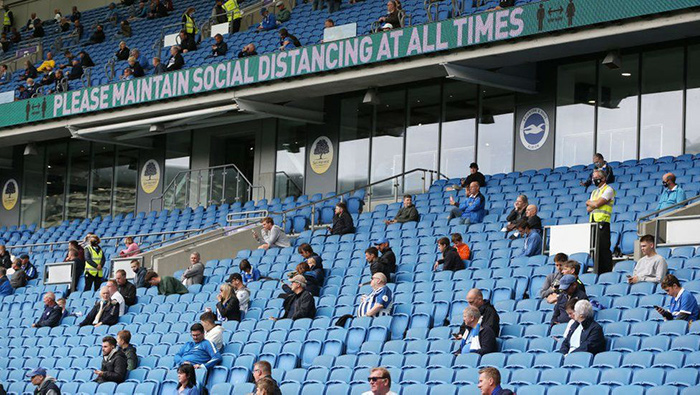Clubs Fearful Of Mass Postponements As Omicron Spreads
 Concerns for clubs and stadia ahead of the busy festive period are growing due to a number of covid outbreaks and increased restrictions as the Omicron variant threatens to wreck havoc.
Concerns for clubs and stadia ahead of the busy festive period are growing due to a number of covid outbreaks and increased restrictions as the Omicron variant threatens to wreck havoc.
The Premier League announced a record 42 positive tests for Covid on Monday night, the most recorded in a single week, with at least five clubs having confirmed cases. Clubs' worries have been exacerbated by the slow pace of their vaccination programmes, which has left the majority of players facing a wait to receive the booster jab required to provide protection against Omicron, after studies showed that two jabs offer little immunity.
Wolverhampton Wanderers are the only top-flight club reportedly set to meet the Prime Minister's target of boosting all over-18s by the end of the month, although Leeds United and Brentford are also understood to be well advanced in their vaccination programmes. Many players at the other clubs face an anxious wait, however, as the Joint Committee on Vaccination and Immunisation still insist on a three-month gap between second and third vaccine doses. The Premier League's vaccine data is a closely guarded secret, but the last information they published on October 19th stated that 68 per cent of players were fully vaccinated. Almost a third of players will therefore have to wait until at least the end of January to receive their booster, because a large number of second doses were not administered until October. The rapid spread of Omicron has exposed the dangers of some players' vaccine hesitancy, which clubs and Premier League officials have been battling all season. With these concerns and positive test results on the increase further disruption may well lead to more stadiums being closed to matches as postponements become commonplace.
 The highest profile most recent postponement involves Manchester United’s scheduled trip to Brentford on Tuesday night has been postponed as a result of positive test results coming out of United’s training ground Carrington, which has been temporarily shut down as a precaution. Tottenham Hotspur’s matches against Rennes and Brighton were called off last week, as was Monday night's Championship game between Sheffield United and QPR. Leicester and Norwich considered postponing their games against Newcastle and Manchester United respectively last weekend before going ahead.
The highest profile most recent postponement involves Manchester United’s scheduled trip to Brentford on Tuesday night has been postponed as a result of positive test results coming out of United’s training ground Carrington, which has been temporarily shut down as a precaution. Tottenham Hotspur’s matches against Rennes and Brighton were called off last week, as was Monday night's Championship game between Sheffield United and QPR. Leicester and Norwich considered postponing their games against Newcastle and Manchester United respectively last weekend before going ahead.
The Premier League insist that with rigorous testing measures and emergency protocols in place they should be able to continue, but sources at several clubs are privately questioning if they can carry on in the event of mass postponements without compromising the competition's integrity – particularly in the busy festive period. Six Premier League games were postponed last Christmas without a shutdown, though, and officials will do everything they can to prevent a suspension of the season.
Even a brief pause would be disastrous, as it would lead to broadcasters demanding rebates and a huge fixture backlog. Extending the campaign into the summer – as happened at the start of the pandemic – would be even more problematic this time around, as the 2022-23 season has already been compressed by the Qatar World Cup taking place in November and December.
As well as the 42 Covid positives – a major increase on 12 the previous week and seven the week before – the Premier League announced the reintroduction of emergency protocols such as wearing face masks indoors and social distancing.
Clubs are also braced to be asked to perform daily Covid tests on players, after checks were upped to three times a week on Friday. While the twice-weekly order was in place, some clubs were already performing more tests than were required as a precaution.
The alternative impact may well come with the potential of further restrictions on supporters themselves, which could greatly affect stadia. Currently as of Wednesday, December 15th spectators will need to show proof of double vaccination or a negative test to attend sporting events with crowds of more than 10,000 people in England. The requirement has already been in place in Scotland, Wales and Northern Ireland, for all events in excess of 10,000 people. However, there is a feeling that with the pace of the spread of infection of Omicron that potential further measures could come into force; whether it be mandatory use of facemasks within stadia (stadiums are currently classed as outdoor venues so exempt), or even social distancing returning, which will be of grave concern to stadia and the events and hospitality sector as a whole, as we enter the busy Christmas period.
















































